Coronavirus: Party conferences in a Covid world
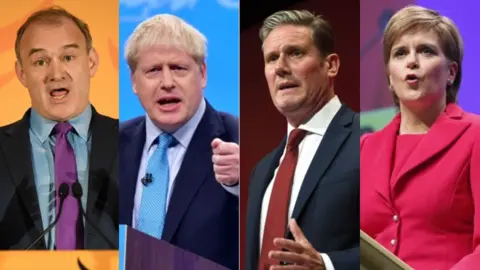 PA Media
PA MediaIt's just not the same.
Coronavirus has robbed politicos of the chance to mingle in their hundreds at party conferences this autumn.
This year's largely online events do not come with an accompaniment of laughs, groans and applause. Intrigues are no longer happening late at night in crowded hotel bars.

Virtual conference dates
- Labour - happened 19 to 22 September
- Liberal Democrats - happened 25 to 28 September
- Conservatives - happened 3 to 6 October
- SNP - October - 28 to 30 November

Instead, Conservatives, Labourites and Liberal Democrats have to watch their leaders speak via Zoom (other video-conferencing apps are available).
The parties insist the events are as vibrant and interesting as possible, but what are the big things to look out for and what has changed?
Conservatives
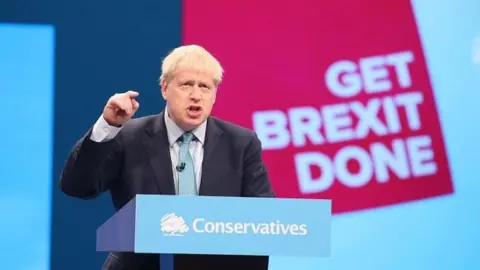 PA Media
PA MediaThe prime minister has known extraordinary highs and lows in the last 12 months, winning the general election by a landslide and having to deal with coronavirus, as well as becoming seriously ill himself.
All the while, the last stages of the Brexit process are proving to be as controversial as the early ones.
Still, Boris Johnson has a parliamentary majority of almost 80, and his speech was to be his great moment before the Tory faithful. It still happened on the last day but with his audience watching on screens.
In it, Mr Johnson promised to create a "new Jerusalem" after the pandemic and dismissed suggestions that he had "lost my mojo" as "drivel".
He pledged to reform care home funding, update the planning system and make the UK a "world leader" in green energy.
The Conservative conference has, for many years, been a slickly run event at which policy is not set.
But the progress of the promises outlined in Mr Johnson's speech will be watched closely, as the country enters another few months of potentially the utmost difficulty.
SNP
In recent years, SNP conferences have grown so much that there are only two venues in Scotland large enough to incorporate them - and one of them has been converted into a temporary hospital amid the coronavirus pandemic.
The party normally likes to pack as many members into these events as possible, but things look set to be very different this year with an entirely virtual conference.
The dates have not yet been confirmed, but it will likely fall as usual around the Scottish school holidays in mid-October, when Holyrood is in recess.
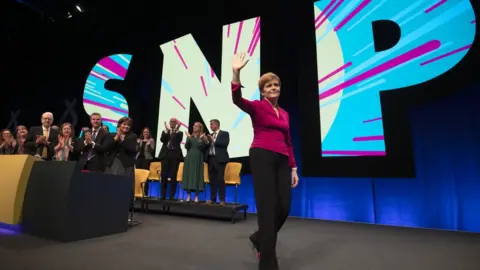 PA Media
PA MediaNicola Sturgeon will be keen to rally her troops, with a Scottish Parliament election looming in 2021 and the party renewing its push for a second independence referendum.
The first minister's keynote speech will be the centrepiece of the event and will be keenly watched both by rivals and supporters for hints about her plans to secure a fresh vote on Scotland's future.
The theme of the party's last conference - also on the eve of an election - was "Stop Brexit", and that other constitutional conundrum is also likely to feature prominently.
The two have become closely intertwined in the political debate in Scotland, and Ms Sturgeon will look to capitalise on that in her bid to return to government in May.
Liberal Democrats
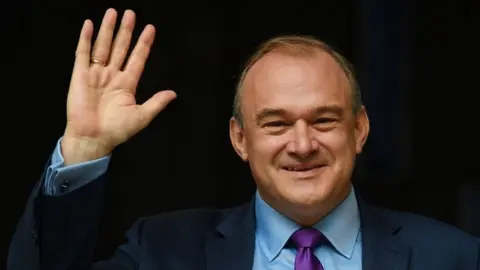 EPA
EPASir Ed Davey became leader of the Lib Dems during the coronavirus crisis and following three poor general election results in a row.
Having urged his party to "wake up and smell the coffee", his speech was seen as the beginning of an effort to raise his profile with voters and re-establish the Lib Dems as an important voice in discussions on the economy, social policy and international affairs.
Sir Ed's speech also dealt with his personal background, including his role as a carer for his disabled son and, when he was a teenager, for his terminally ill mother.
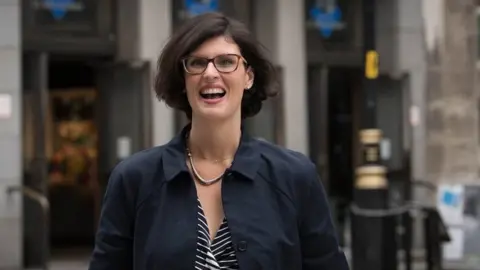 PA Media
PA MediaForeign affairs spokeswoman Layla Moran, who lost to Sir Ed in the leadership contest, was among the other key speakers, as were Welsh leader Jane Dodds and Scottish leader Willie Rennie.
Unlike Labour (see below), the Lib Dems still held votes this year, following debates on subjects including Brexit, the impact of Covid-19 on the elderly and universal basic income.
The party's constitution states that votes - which make, rather than inform, its policies - must take place at conference. This year's was meant to happen in Brighton.
Speakers in debates had to register for an "electronic card" allowing them to take part and votes were cast online.
Labour
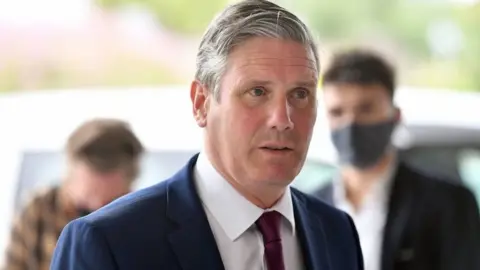 PA Media
PA MediaThe party changed the name of its conference to Labour Connected, which, it said, was about "people coming together, to create a fairer and better society".
With the events mostly presented from the party's HQ in central London, rather than as previously intended in Liverpool, it included online training on how to get more would-be councillors and MPs elected. This, according to a party source, was part of a "conscious" desire to make Labour more professional in its campaigning, following its trouncing by the Conservatives at the last general election.
Sir Keir Starmer, in his first conference speech since becoming leader, hammered home the need to win power, attacking Boris Johnson for "serial incompetence". He urged activists to show their "patriotism" in an effort to reach out to the party's traditional support base.
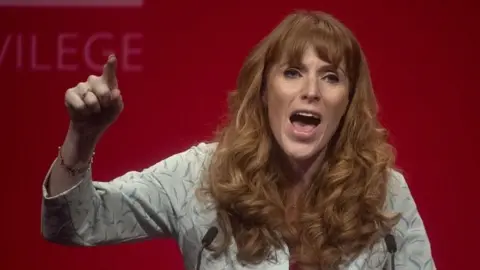 PA Media
PA MediaBut his address, delivered online during a visit to Doncaster, lacked the usual razzmattazz and audience engagement.
Sir Keir's unifying message followed the bitter divisions of the Corbyn years and came amid murmurings from left-leaning unions such as Unite and the Fire Brigades Union about his own leadership.
The Labour conference differed markedly from normal in having no votes. Delegates' decisions are part of the party's policy-making process, but they did not happen this year.
No extra conference is taking place in the spring, so it is likely members will not get to vote on policy again until next autumn, pandemic-permitting.
